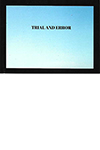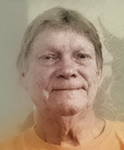Review — TRIAL AND ERROR by Lawrence Licht (Peru)
 Trial And Error (poetry and photography)
Trial And Error (poetry and photography)
Lawrence E. Licht (Peru 1963–65)
Independently published
April 2022
40 pages
$15 [plus shipping to the USA, $6-10] (paperback), Contact the author
Reviewed by Bill Preston (Thailand 1977-80)
•
The array of living forms is staggering,
diversity incomprehensible in real terms.
A description of even one is like
holding the wind with open palm.
So begins poet and photographer Larry Licht’s slim and noteworthy book, Trial and Error. Minimalist in design, the book features a series of two-page spreads, arranged in corresponding pages of poetry and photographs. As the poetic opening lines express, ordinary language seems insufficient to describe the natural world in its multitude of diverse forms. Perhaps a more satisfying approach, Licht suggests, is to explore nature’s exquisite intricacy via metaphor and image. Fittingly, each of his twenty spreads is a kind of meditation in words and images on facets of the natural world.
Some reflections wax ecstatically on particular natural phenomenon:
The sublime puzzle and joy of seeing
upstretched wings of a resting Monarch
making its monumental migration to Mexico with
milkweed, wind, and stars to bless its journey.
Sometimes the musings touch on larger themes and notions, such as time, space, evolution, as well as existential questions, like who are we? and where do we come from? In the following lines, Licht ponders the miraculously complex processes that constitute the existence of various life forms:
Millennia of minute cosmic assaults,
Irradiation of mass and matter,
mutations within spiral bound phosphate bonds
breaking organic links to place and space,
realigning tested traits suited to survival
in some soupy clay or brackish pond.
Another time, alluding to the book’s title, he contemplates the Darwinian trial-and-error process of evolution, wherein some species advance, and others fail:
A final potpourri of congruous couplings that
regulate each and every event by
trial and error.
Those that fail doomed to fall by
wandering waysides,
remaining relegated to critical piles of
detritus and debris,
useful as grains of growth for root hairs
under leafy storage sites in self feeding greenery
sustaining the pinnacled pyramid.
As demonstrated above and elsewhere, Licht makes effective use of alliteration–congruous couplings, fail doomed to fall, wandering waysides, detritus and debris, grains of growth, pinnacled pyramid—affording rhythm and momentum to his poetic lines. Moreover, the notion (and wonderful final image) expressed here–that even life that fails to survive has a unique purpose in “sustaining the pinnacled pyramid” of the life forms that do—is beautiful and appealing.
Most of the poetry and all the photos in Trial and Error express a profound sense of awe and wonder regarding nature and all creation. Toward the end, Licht evokes a somewhat darker, more skeptical and ambivalent view, regarding where human beings fall within the larger scheme of living things.
Our respects paid
by tractors and asphalt parking lots,
glitzy condominiums,
monolithic malls,
erected to our addictive cry for immortality.
Diamonds and trinkets,
gadgets and goods,
designed to cover our fear and fright
in knowing
we will not be here forever.
Here, human creations — parking lots, condos, malls, trinkets, gadgets — stand in poor and fleeting contrast to rich, enduring natural life cycles of the earth. I was reminded of the refrain in Joni Mitchell’s song, Big Yellow Taxi:
Don’t it always seem to go
That you don’t know what you’ve got ‘til it’s gone?
They paved paradise, put up a parking lot.
I sense an underlying elegiac quality as well to Licht’s reflections here, a certain sadness that humankind’s ongoing abuse and poor stewardship is causing the natural world to deteriorate before our eyes.
As someone who enjoys poetry and photography, I appreciate Larry Licht’s artistic skills, and the way he harnesses them here to create a book that is both a celebration and cautionary tale. Trial and Error is Larry’s homage to life on Earth, an ode to nature in all its diversity. He invites us to delight in these wonders, while urging us to protect our fragile planet from further damage while there still is time.
•
 Born and raised in St. Louis, Missouri, Larry Licht (Peru 1963–65) has degrees from Washington University, University of Texas, and University of British Columbia. I taught biology and ecology at York University in Toronto, Ontario for about 40 years until my retirement 10 years ago, and move to western Canada.
Born and raised in St. Louis, Missouri, Larry Licht (Peru 1963–65) has degrees from Washington University, University of Texas, and University of British Columbia. I taught biology and ecology at York University in Toronto, Ontario for about 40 years until my retirement 10 years ago, and move to western Canada.
Larry’s thoughts about his book: We live on planet Earth filled with places of extreme natural beauty. We are surrounded by other living forms, flora and fauna, that are astounding in the intricacy and complexity of their life histories. Our libraries are filled with tomes on research and theories trying to explain the origins, presence and habits of these organisms in the world around us.
As a biologist and ecologist, I have spent over 50 years studying aspects of animal evolution and behaviour. Despite the good intentions of the scientific method and its goal of understanding, for me, there came a time when life on earth was seen as beyond comprehension. Our mere existence, along with all living forms and formations, became a wonder that must be felt and appreciated, not just intellectually, but deeply within our souls and psyches. Sadly, the current state of our Earth shows the consequences of our negative response to the environment.
This small book, with selected photos, is my reflection upon this situation.
•

Bill Preston
Reviewer Bill Preston (Thailand 1977-80) was a community organizer in a VISTA project in Yonkers, New York, and later taught at-risk students at an alternative school there. In the Peace Corps, he taught English and trained Thai teachers of English; subsequently, he interviewed Lao and Khmer refugees seeking asylum in the Unites States. At Galang refugee camp, he trained Indonesian teachers, who taught English to Vietnamese refugees. For many years he edited English Language Teaching materials for several educational publishers. His multicultural anthology, A Sense of Wonder: Reading and Writing through Literature, was published by Pearson Education (2003). His poetry collection, Strange Beauty of the World: Poems, was published in August 2019 by Peace Corps Writers, and won the 2020 Peace Corps Writers Award for Best Book of Poetry.
THE UKRAINE CORPSE WAVES AT THE WORLD CRYING: EXODUS
Mental agility, fleshbound, wrapt, justified in strange beauty exploding in the glands, sea weak in the sliding light trembling, lurching into dripping sleep as the body exhausts the mind from Troy to Mariupol rubbled.
Caught in some wave of worlds, gape-drunk, fingers spread beside our faces tentacling fugues of the scents of uncontrollable theaters slanting to the foot that dangles, drifting to a distant bed from Troy to Mariupol rubbled.
Apollo flowers in sacred streams foolish frantic hot burning and aching, time gets up from the corners moving stories skittering in rosey smoke of unacknowledged manners of chalk blocks from Troy to Mariupol rubbled..
Caught in some wave of worlds, gape-drunk, fingers spread beside our faces tentacling fugues of the scents of uncontrollable theaters slanting to the foot that dangles, drifting to a distant bed from Troy to Mariupol rubbled.
Memories are a scar hedge spanning afternoon’s indifferent faces that stop to meditate the sealed gates of preference like fresh eggs sizzling, melting in butter slowly foaming into the love of freedom from Troy to Mariupol rubbled.
Caught in some wave of worlds, gape-drunk, fingers spread beside our faces tentacling fugues of the scents of uncontrollable theaters slanting to the foot that dangles, drifting to a distant bed from Troy to Mariupol rubbled.
Eat, salting, peppering to taste, looking at the trees, ingesting deeper with morning horses, ghost dancers going at speed from Troy to Mariupol rubbled.
(C) Copyright Edward Mycue May 4, 2022 Wednesday 9:50am
Hi Bill: Please accept my apology for not having written to you earlier. Nearly a year ago, you wrote a very moving review of my work, Trial and Error, and your words made me feel that you had connected with those I had written. I now want to thank you for your time and consideration in writing the positive review. You as. as a poet yourself, knows how good it feels to learn that one’s thoughts and emotions have been shared effectively. Cheers, Larry.
[…] crisis in his retirement years, but not as a biologist. Last year he self-published a short book, Trial and Error (2022), that features a series of poems and photos. At the time of its publication, he wrote: “As […]